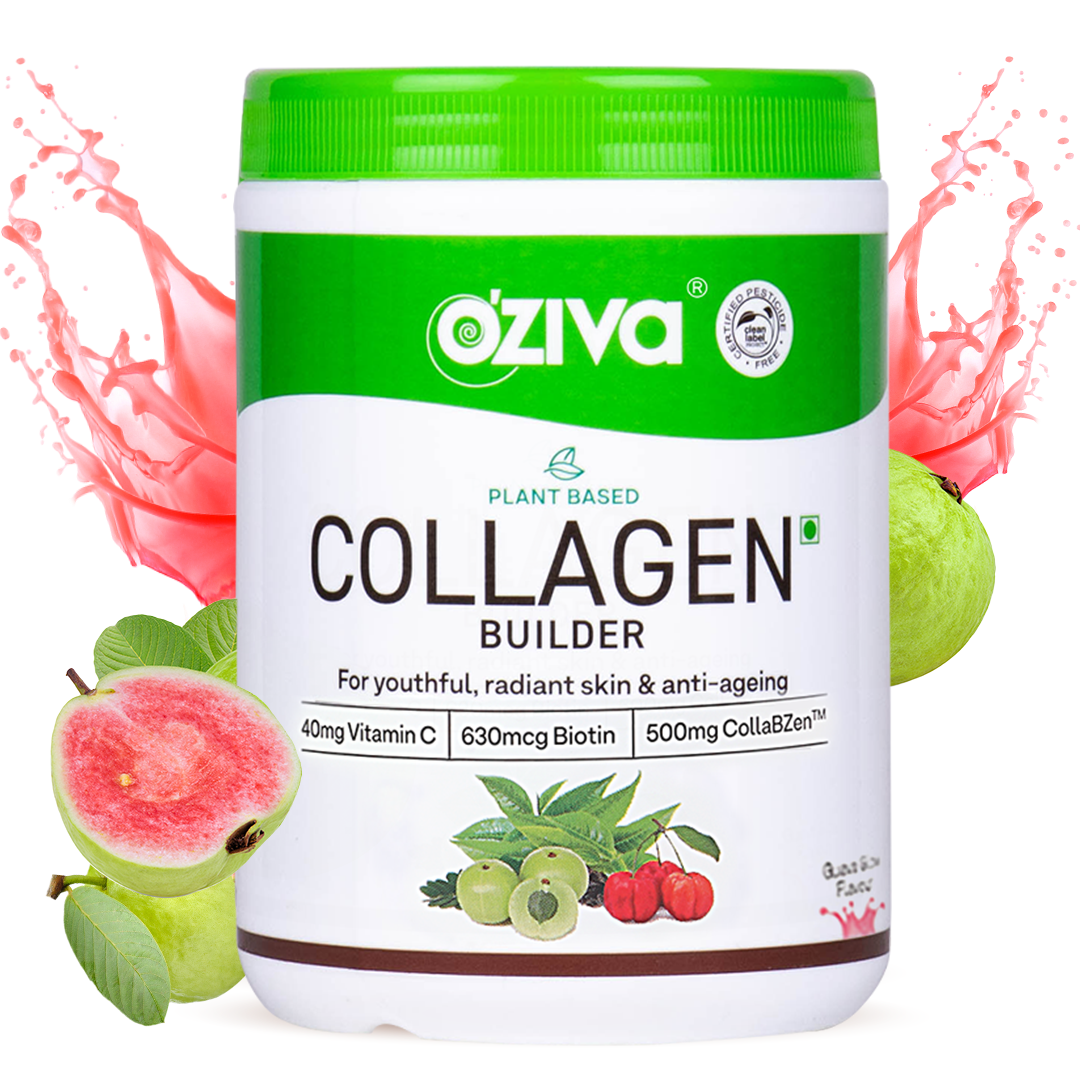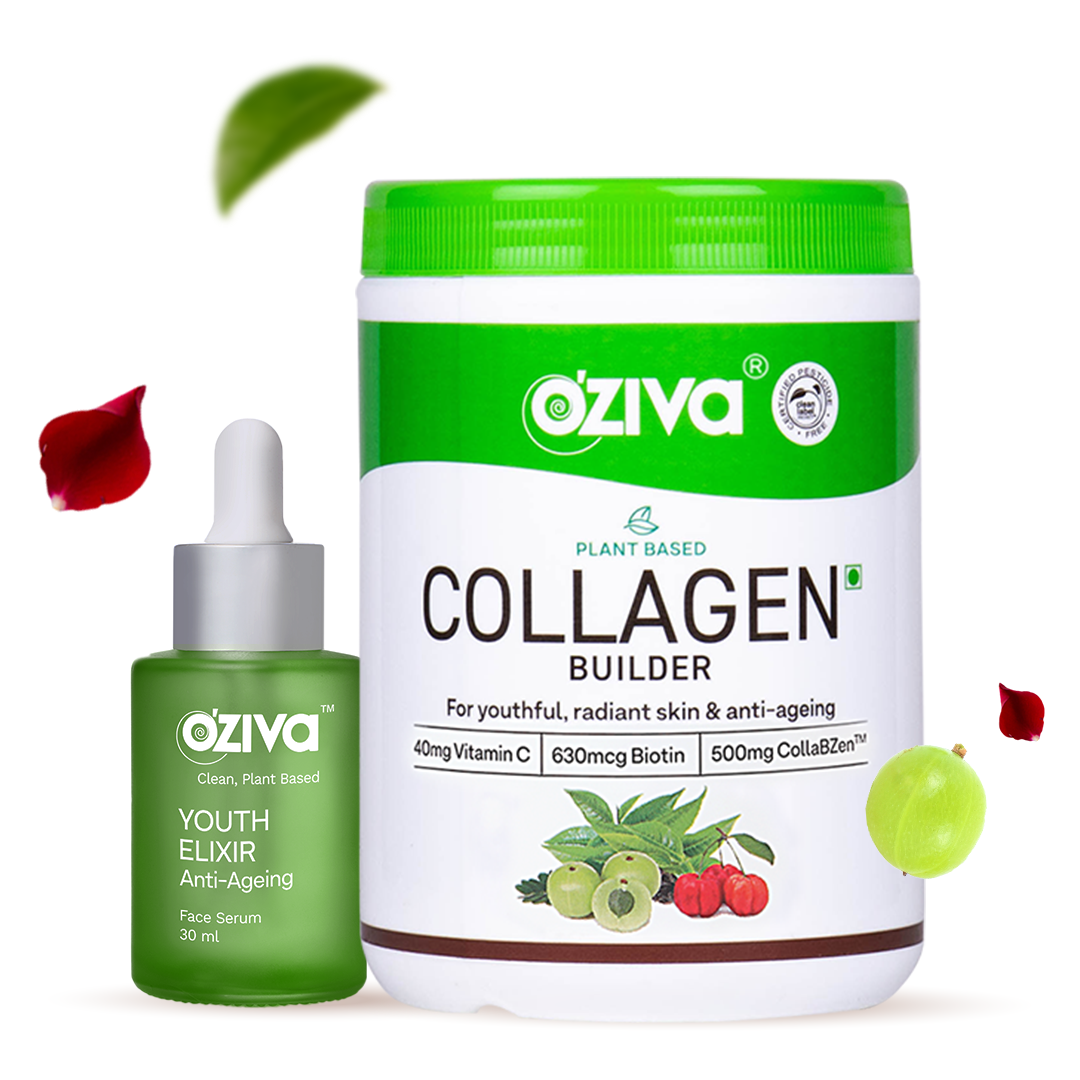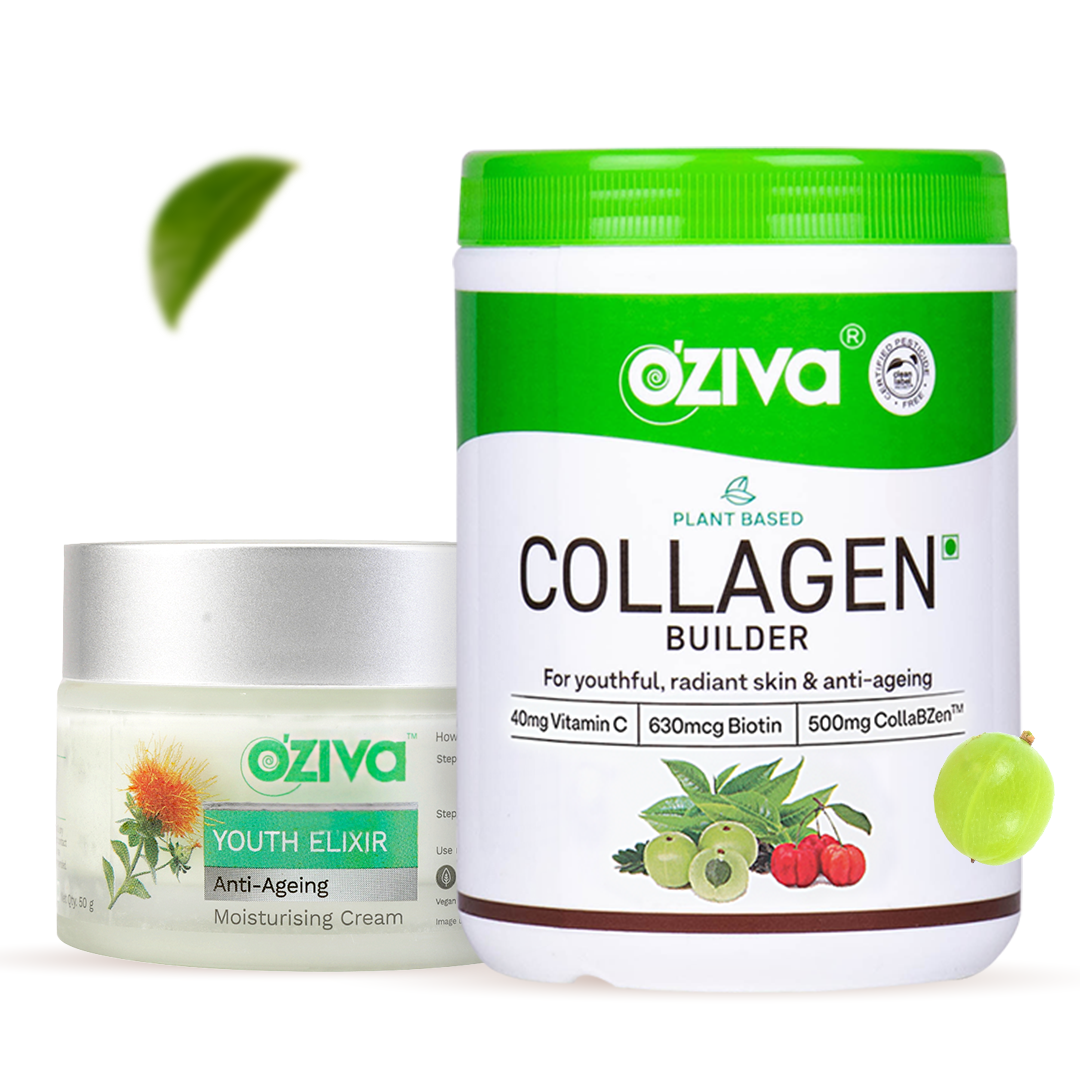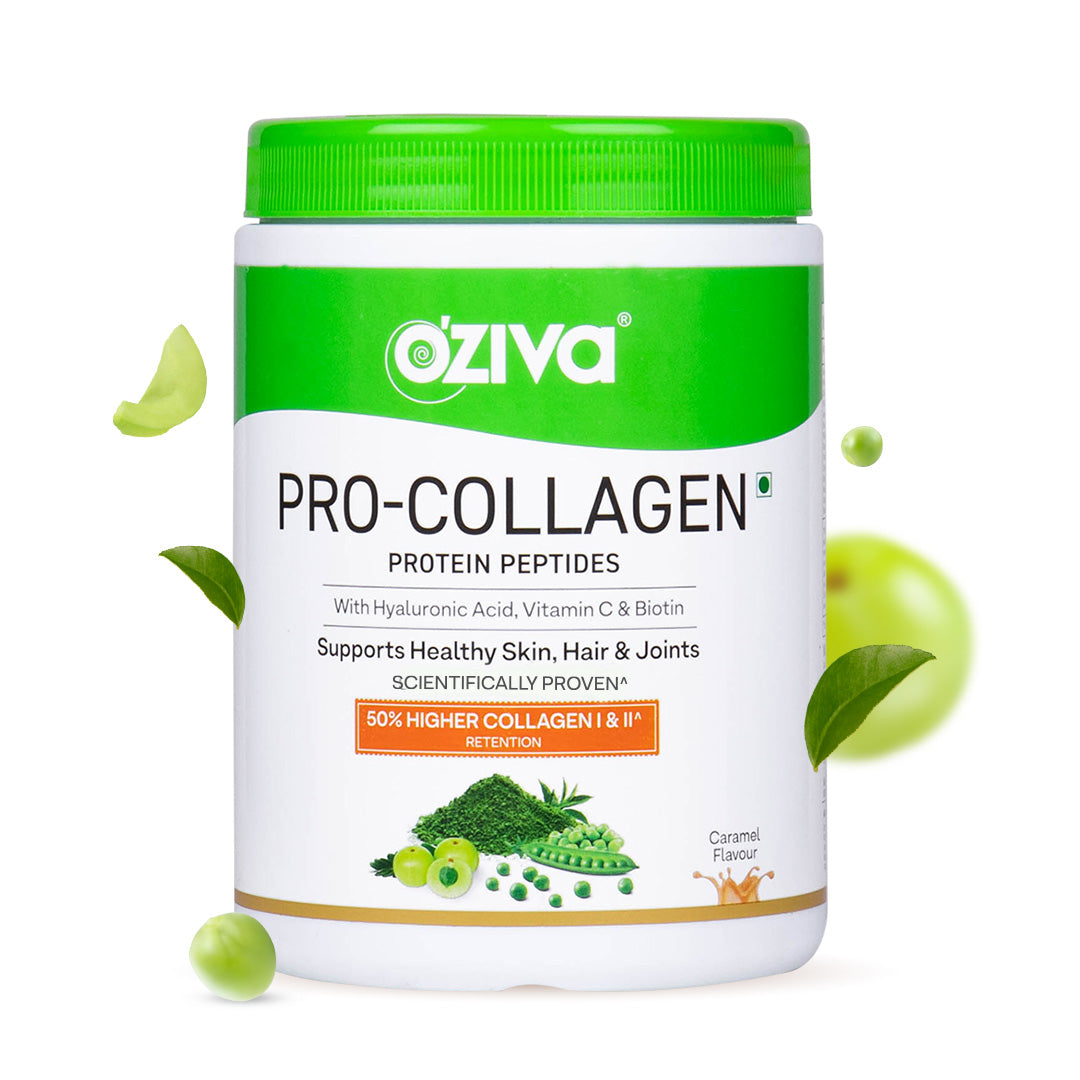Clean and Plant Based
Enriched with Ayurveda
Personalized Guidance
Collagem Supplementation: Overview, Uses, Side Effects
Collagen supplementation, especially collagen supplementation for skin health, has gained significant popularity in recent years due to its potential benefits for skin health, joint function, and overall well-being. We’ll talk about collagen supplementation, collagen supplementation benefits, and any possible collagen supplementation side effects in this article.
First, let’s start by discussing collagen itself, before we go on to the topic of collagen supplementation. Collagen is a structural protein that plays a vital role in maintaining the strength and elasticity of various tissues in the body. While our bodies naturally produce collagen, its production decreases with age (especially after the age of 25), leading to various signs of ageing and joint discomfort. This has led many individuals to turn to collagen supplementation as a means of replenishing collagen levels and potentially reaping collagen supplementation benefits.
Collagen Supplementation Benefits
One of the primary reasons people seek collagen supplementation is to improve the health and appearance of their skin. Collagen is a key component of the skin's structure, providing strength, elasticity, and hydration. As we age, collagen production declines, resulting in wrinkles, sagging skin, and decreased skin elasticity. Through collagen supplementation for skin health, individuals hope to counteract these effects and promote a more youthful complexion. Several studies have shown promising results, suggesting that collagen supplementation for skin health can improve skin elasticity, hydration, and reduce the appearance of wrinkles.
Additionally, collagen supplementation may have positive effects on joint health. Collagen is a major component of cartilage, which cushions and protects joints. As we age, cartilage naturally wears down, leading to joint stiffness, pain, and conditions such as osteoarthritis. Some studies suggest that collagen supplementation can help reduce joint pain, improve joint function, and potentially slow down the progression of joint-related conditions. However, more research is needed to definitively establish the effectiveness of collagen supplementation and collagen supplementation benefits for joint health.
Collagen supplementation plays a significant role in maintaining bone strength and density. As we age, bone mineral density decreases, increasing the risk of conditions like osteoporosis and fractures. Collagen supplementation has shown promise in improving bone mineral density and supporting bone health. It may enhance bone strength, reduce the risk of fractures, and contribute to overall skeletal health.
Collagen supplementation is also essential for muscle health and recovery. It is a major component of connective tissues that support and hold muscles together. Collagen supplementation has been suggested to promote muscle growth, enhance muscle strength, and improve exercise performance. It may also aid in post-workout recovery by reducing muscle soreness and inflammation.
The gut lining relies on collagen to maintain its integrity and function properly. Collagen helps to strengthen and repair the intestinal lining, contributing to a healthy gut. Collagen supplementation with collagen peptides may support a healthy digestive system by promoting gut barrier function, reducing inflammation, and supporting the healing of damaged intestinal tissues.
Collagen is a building block for hair and nails, and collagen supplementation may have positive effects on their health and appearance. It can help strengthen hair follicles, improve hair thickness and texture, and promote healthy nail growth.
Collagen provides structural support to the blood vessels, helping maintain their elasticity and integrity. Some studies suggest that collagen supplementation may have cardiovascular benefits, such as reducing artery stiffness, improving blood flow, and supporting heart health. However, more research is needed to establish these effects of collagen supplementation and other collagen supplementation benefits definitively.
Collagen Supplementation - A Guide to Types of Collagen
Understanding the different types of collagen and their uses can help in choosing the appropriate collagen supplementation or targeted treatment. Let's explore the primary types of collagen and their applications:
- Type I Collagen: This is the most abundant type of collagen in the body, found in the skin, tendons, bones, and connective tissues. It provides structural support and contributes to the strength and elasticity of these tissues. Type I collagen is commonly used in skincare products to improve skin elasticity, reduce wrinkles, and promote a youthful appearance. Type I collagen supplementation for skin health is what you might be looking at.
- Type II Collagen: Found mainly in cartilage, type II collagen is crucial for maintaining joint health. It provides the structure and flexibility needed for smooth joint movement. Type II collagen supplementation is often used to support joint function, reduce joint pain, and alleviate symptoms of osteoarthritis. There are many collagen supplementation benefits with Type II Collagen.
- Type III Collagen: Type III collagen is often found alongside type I collagen and provides structural support in organs, muscles, blood vessels, and skin. It helps maintain the integrity and elasticity of these tissues. Type III collagen supplementation may be beneficial for promoting skin health and supporting organ function.
- Type IV Collagen: Type IV collagen forms a crucial component of basement membranes, which are thin layers that provide support to various tissues and organs. It plays a vital role in maintaining the integrity of blood vessels, filtering systems in the kidneys, and the skin's basement membrane. Type IV collagen is not typically used in collagen supplementation but is essential for the proper functioning of these tissues.
- Type V Collagen: Type V collagen is often found in association with type I collagen and contributes to the structure of tissues such as hair, nails, and cell surfaces. It plays a role in tissue organization and provides support to these structures. While less commonly used in collagen supplementation, type V collagen may be included in some formulations targeting hair and nail health along with other collagen supplementation for skin health.
- Type X Collagen: This type of collagen is primarily found in the growth plates of developing bones. It helps with bone mineralization and the formation of new bone tissue. Type X collagen is not commonly used in collagen supplementation but is important for skeletal development and bone health.
During the process of collagen supplementation, the specific source may affect the types of collagen present in the supplement. There are also plant-based collagen alternatives available that contain ingredients that support collagen synthesis, such as amino acids and vitamins, especially Vitamin C. Plant-based collagen supplementation often relies on collagen builders that increase the amount of collagen naturally present within your skin.
In summary, understanding the various types of collagen and their uses is important for selecting the appropriate collagen supplementation or targeted treatments. Different types of collagen are found in various tissues and serve specific functions in the body. Whether you're looking to improve skin elasticity, support joint health, or target specific tissues, choosing the right type of collagen supplement can help address your specific needs effectively. Consultation with healthcare professionals or skincare experts can provide personalized advice on collagen supplementation, collagen supplementation for skin health and the best type of collagen and formulation for your desired outcomes.\
Collagen Supplementation Guidelines
Before starting collagen supplementation, it's essential to consider a few factors. You might be wondering about any potential collagen supplementation side effects.
First, consult with a healthcare professional, particularly if you have any pre-existing medical conditions or are taking medications, as they can provide personalized advice and guidance. It's also important to choose a high-quality collagen supplement from a reputable manufacturer to ensure purity and effectiveness. Look for products that have been tested by third-party laboratories for quality and safety when it comes to collagen supplementation.
Another consideration is the dosage and duration of your collagen supplementation. The optimal dosage of collagen can vary depending on individual needs and goals. Some studies have suggested that a daily dosage of 2.5 to 10 grams of collagen peptides may be beneficial for skin health and joint support. However, more research is needed to determine the optimal dosage and duration for different purposes.
Our expert team of nutritionists at OZiva suggests taking OZiva Plant Based Collagen Builder as your collagen supplementation for the best results. OZiva Plant Based Collagen Builder contains 21 natural wholefoods to help build collagen naturally in the body. This form of collagen supplementation has been Certified Vegan by the Vegan Society of UK, meaning it is completely free of any ingredients sourced from animals. It helps reduce fine lines, wrinkles and age spots, gives your skin a youthful glow, and also hydrates your skin to give it a soft, dewy look. Consume 2 scoops (6g) in the evening before bedtime in around 150 ml of water for 3-6 months for the best results!
We also have another recommendation for you to try our OZiva Pro Collagen Protein Peptides, which are collagen peptides that work great as collagen supplementation for skin health. OZiva Pro-Collagen Protein Peptides supports 50% Higher Collagen I and II Retention*, This form of collagen supplementation for skin health improves skin & hair health, muscular & joint health, hormonal balance, and immunity with the help of peptides.
It's worth noting that while collagen supplementation can be beneficial, it's not a magical solution for all health concerns. Maintaining an overall healthy lifestyle, including a balanced diet, regular exercise, and proper skincare, is crucial for achieving optimal results. Collagen supplementation should be seen as a complement to a healthy lifestyle rather than a standalone solution.
In conclusion, collagen supplementation holds promise for promoting skin health, joint function, and overall well-being. Collagen supplementation for skin health can help improve skin elasticity, hydration, and reduce the appearance of wrinkles. It may also support joint health by reducing pain and improving joint function.
However, more research is needed to establish the efficacy of collagen supplementation definitively, and individual results may vary. Before starting collagen supplementation, it's important to consult with a healthcare professional and choose a high-quality product. By considering these factors and incorporating collagen supplementation into a healthy lifestyle, individuals may experience the potential collagen supplementation benefits it offers.
- Choosing a selection results in a full page refresh.
- Press the space key then arrow keys to make a selection.






